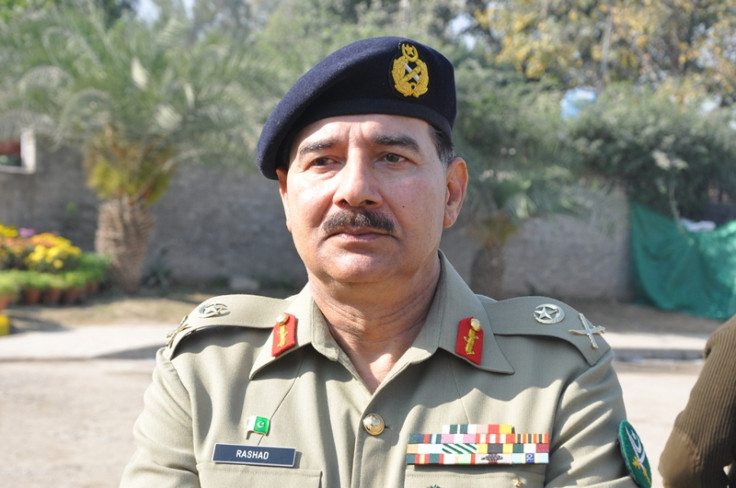Meet The New Boss: Pakistan Names New Army Chief, Who Must Face Taliban Insurgency And Other Daunting Threats

Pakistan has named a new commander-in-chief of its army, perhaps the most powerful position in the country, after weeks of heightened speculation. Lieutenant General Raheel Sharif will replace General Ashfaq Pervez Kayani, who is retiring on Thursday. The government also named Lieutenant General Rashid Mahmood as the new chairman of the Joint Chiefs of Staff Committee.
BBC reported that Sharif, a career infantry soldier, is expected to maintain Kayani’s policies and not interfere with politicians in Islamabad, while keeping up the offensives against the Taliban and other militant groups that plague Pakistan with ceaseless violence.
In addition, the appointment of Raheel Sharif would suggest that Prime Minister Nawaz Sharif (who is not related to the new army chief) took his time with the appointment, considering that he ran afoul of the military during his previous tenures in office in the 1990s. Indeed, in 1999, Nawaz was removed from power in a coup engineered by General Pervez Musharraf (whom Nawaz had named as army boss). During an earlier term in the early 1990s army chief Abdul Waheed Kakar (whom Nawaz had also appointed) tried to pressure Nawaz to resign to resolve an ongoing spat with President Ghulam Ishaq.
As for Raheel, BBC reported that little is known about him, except that he was not regarded as especially ambitious and that he previously served as inspector general of the army’s training and evaluation department and also headed Pakistan’s most prestigious military training institution, the Military Academy in Abbottabad. Dawn, an English-language Pakistani newspaper, noted that Raheel’s selection was somewhat of a surprise and that Nawaz ignored the front-runner, Lieutenant General Haroon Aslam, who is currently serving as chief of logistic staff.
Now, as head of a powerful institution that has shifted away from solely focusing on India and more to the domestic terrorist threat, Raheel will also have to cope with the continuing dispute over Kashmir and the winding down of the NATO military presence in Afghanistan after a dozen years. He must also seek to soothe relations between the Pakistani army and the U.S. government that was tattered by revelations that former al Qaeda chief Osama bin Laden was living in a compound in Abbottabad prior to his assassination by U.S. Navy Seals in 2011. In addition, the U.S. policy of dropping unmanned drone missiles on the lawless borders between Afghanistan and Pakistan (thereby killing many civilians) represents another sore point between Islamabad and Washington.
"[Raheel] Sharif has played a big role in convincing the army that the Tehrik-e-Taliban Pakistan (TTP) and assorted militants inside Pakistan are as big a threat [as India]," a retired senior army officer who once commanded Raheel told Reuters. Nawaz, the first beneficiary of a democratically elected government peacefully transferring power to another, is likely concerned about keeping a lid on the military, which has staged three coups in Pakistan since the nation’s founding in 1947 and run the state for about half of the time since.
Raheel is 57 years old and hails from a military family of high pedigree, Pakistan’s The Nation newspaper reported. His elder brother Shabbir Sharif was a highly decorated soldier who died in the Bangladesh independence war in 1971. Analyst Hasan Askari said that with respect to leading Pakistan’s 600,000-strong army, Raheel will take an uncompromising approach in the war against the militant insurgency. "[Raheel] belongs to a family of soldiers, his father was a martyr, his brother was honored with the highest military award, so I expect he will go [after] the extremist groups and clear the tribal areas," Askari told Agence France-Presse. "He has to secure the border with Afghanistan, so I think he will consult with his senior top brass officers and clear the troubled area along the Durand Line [the Afghan-Pakistani border].”
Kayani, who at 61 is only four years older than Raheel, is resigning after leading the army for six years. Described as “taciturn” and “chain-smoking” by Pakistani media, Kayani also led the Inter-Services Intelligence, Pakistan’s spy network.
A report in Deutsche-Welles, the German news agency, suggests that Kayani’s departure leaves a big hole in Pakistan’s military leadership and may create more insecurity. However, given the increase in militant and sectarian violence in Pakistan under his watch, Kayani’s legacy is less than stellar. "As an institution, the Pakistani army has not cut off ties with Islamist extremist groups such as the Lashkar-e-Taiba, the Haqqani Network and the Quetta Shura," Malik Siraj Akbar, a Washington-based Pakistani analyst, told DW. "Under Kayani's leadership, some segments of the Pakistani military developed contempt for the Taliban but this does not represent a shift in the army's institutional support for radical groups."
Indeed, Akbar believes that Kayani’s battle against the Taliban was half-hearted and that he only opposed the militants when they attacked army targets. "I believe General Kayani didn't make as much effort to fight extremism in Pakistan as Musharraf did," Akbar added.
However, an Islamabad-based retired army general and security analyst named Talat Masood praised Kayani. "The operations in Swat and South Waziristan were very successful in pushing back the Taliban,” he told DW. “It is true that Kayani was reluctant to do the same in North Waziristan, but then his hands were tied. He didn't get any backing from the civilian government.”
© Copyright IBTimes 2024. All rights reserved.





















